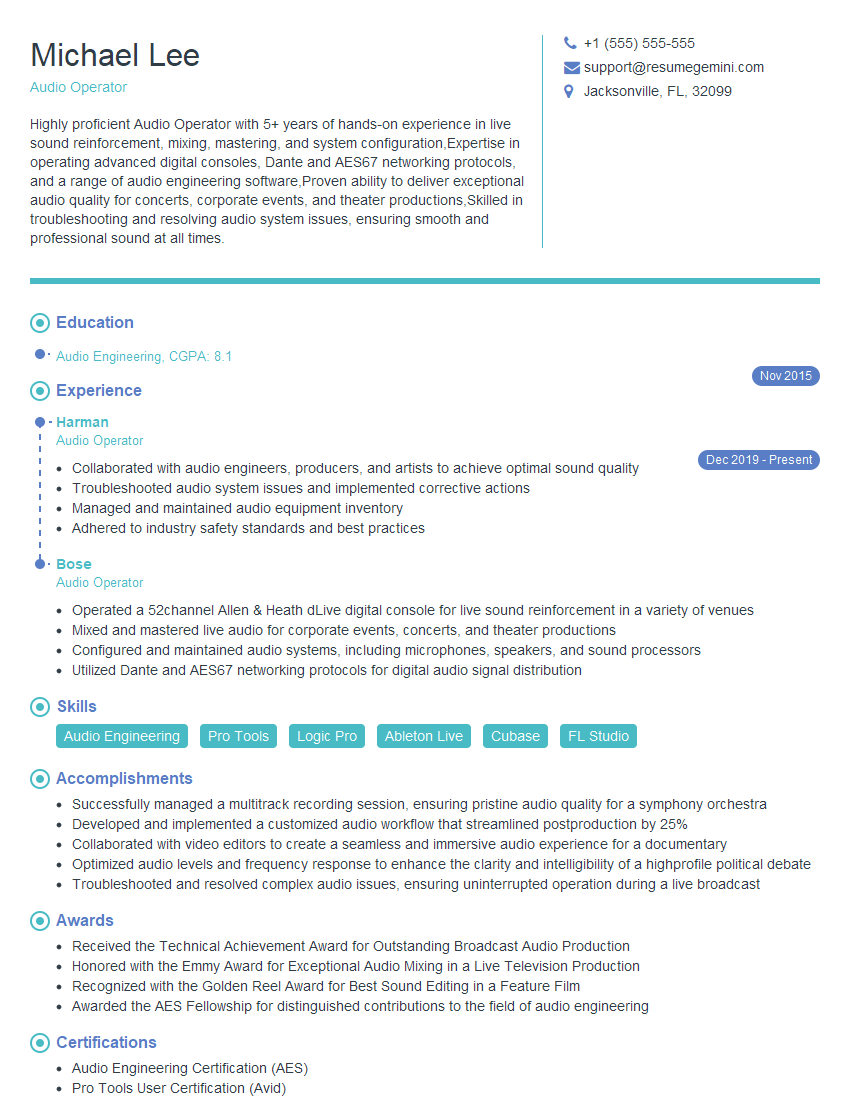Are you a seasoned Audio Operator seeking a new career path? Discover our professionally built Audio Operator Resume Template. This time-saving tool provides a solid foundation for your job search. Simply click “Edit Resume” to customize it with your unique experiences and achievements. Customize fonts and colors to match your personal style and increase your chances of landing your dream job. Explore more Resume Templates for additional options.

Michael Lee
Audio Operator
Summary
Highly proficient Audio Operator with 5+ years of hands-on experience in live sound reinforcement, mixing, mastering, and system configuration,Expertise in operating advanced digital consoles, Dante and AES67 networking protocols, and a range of audio engineering software,Proven ability to deliver exceptional audio quality for concerts, corporate events, and theater productions,Skilled in troubleshooting and resolving audio system issues, ensuring smooth and professional sound at all times.
Education
Audio Engineering
November 2015
Skills
- Audio Engineering
- Pro Tools
- Logic Pro
- Ableton Live
- Cubase
- FL Studio
Work Experience
Audio Operator
- Collaborated with audio engineers, producers, and artists to achieve optimal sound quality
- Troubleshooted audio system issues and implemented corrective actions
- Managed and maintained audio equipment inventory
- Adhered to industry safety standards and best practices
Audio Operator
- Operated a 52channel Allen & Heath dLive digital console for live sound reinforcement in a variety of venues
- Mixed and mastered live audio for corporate events, concerts, and theater productions
- Configured and maintained audio systems, including microphones, speakers, and sound processors
- Utilized Dante and AES67 networking protocols for digital audio signal distribution
Accomplishments
- Successfully managed a multitrack recording session, ensuring pristine audio quality for a symphony orchestra
- Developed and implemented a customized audio workflow that streamlined postproduction by 25%
- Collaborated with video editors to create a seamless and immersive audio experience for a documentary
- Optimized audio levels and frequency response to enhance the clarity and intelligibility of a highprofile political debate
- Troubleshooted and resolved complex audio issues, ensuring uninterrupted operation during a live broadcast
Awards
- Received the Technical Achievement Award for Outstanding Broadcast Audio Production
- Honored with the Emmy Award for Exceptional Audio Mixing in a Live Television Production
- Recognized with the Golden Reel Award for Best Sound Editing in a Feature Film
- Awarded the AES Fellowship for distinguished contributions to the field of audio engineering
Certificates
- Audio Engineering Certification (AES)
- Pro Tools User Certification (Avid)
- Ableton Live Certified Trainer
- Dolby Atmos Certified
Career Expert Tips:
- Select the ideal resume template to showcase your professional experience effectively.
- Master the art of resume writing to highlight your unique qualifications and achievements.
- Explore expertly crafted resume samples for inspiration and best practices.
- Build your best resume for free this new year with ResumeGemini. Enjoy exclusive discounts on ATS optimized resume templates.
How To Write Resume For Audio Operator
- Highlight your technical expertise and experience with industry-standard audio equipment, software, and protocols
- Showcase your problem-solving skills and ability to handle unexpected challenges on-site
- Emphasize your teamwork and communication abilities, as collaboration is crucial in this role
- Consider including a portfolio or demo reel to demonstrate your audio engineering capabilities
Essential Experience Highlights for a Strong Audio Operator Resume
- Operate and manage audio consoles, mixers, and other audio equipment to control and enhance sound quality
- Configure and maintain audio systems, including microphones, speakers, and sound processors, to meet specific event requirements
- Mix and master live audio during performances and recordings to achieve optimal balance and clarity
- Utilize digital audio networking protocols (e.g., Dante, AES67) for efficient and flexible audio signal distribution
- Collaborate with audio engineers, producers, and artists to translate their creative vision into exceptional sound
- Troubleshoot audio system issues, identify root causes, and implement corrective actions promptly
Frequently Asked Questions (FAQ’s) For Audio Operator
What are the typical skills and qualifications required for an Audio Operator?
Typically, an Audio Operator requires a strong understanding of audio engineering principles, proficiency in operating audio consoles and equipment, and experience in mixing and mastering live audio. Industry-recognized certifications, such as those offered by the Audio Engineering Society (AES), are also valuable.
What are the key responsibilities of an Audio Operator?
Key responsibilities include operating audio consoles and equipment, configuring and maintaining audio systems, mixing and mastering live audio, troubleshooting audio system issues, and adhering to industry safety standards.
What industries and settings do Audio Operators typically work in?
Audio Operators work in various industries and settings, including live events, recording studios, broadcasting, film and television production, and corporate events.
What is the career path and potential for growth for an Audio Operator?
With experience and additional training, Audio Operators can advance to roles such as Audio Engineer, Production Sound Mixer, or Technical Director.
How can I improve my skills and stay updated as an Audio Operator?
To stay updated and improve skills, consider attending industry workshops and conferences, obtaining certifications, and networking with other professionals in the field.